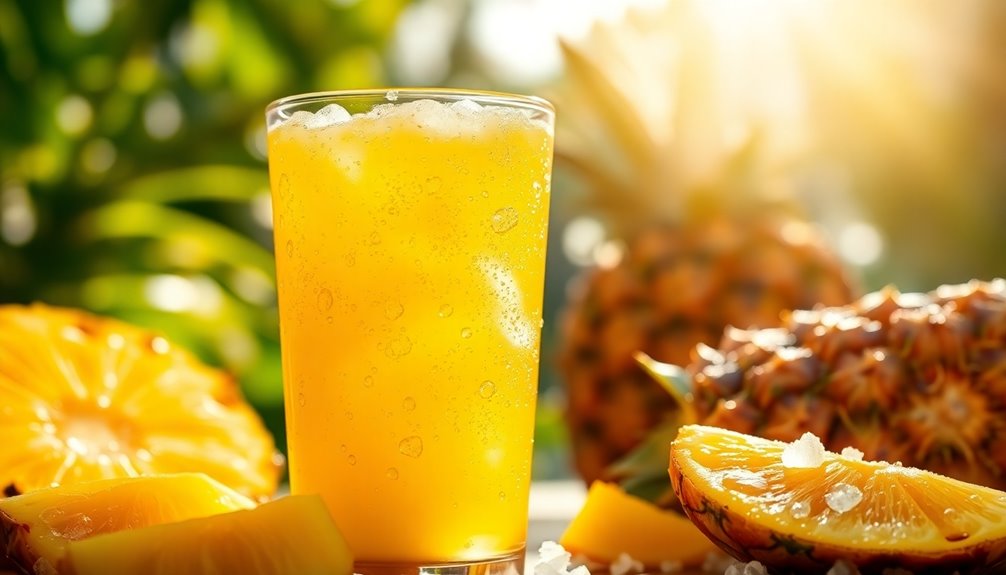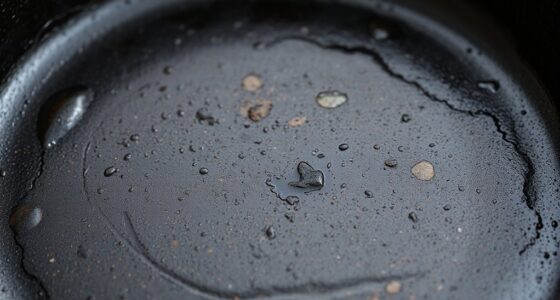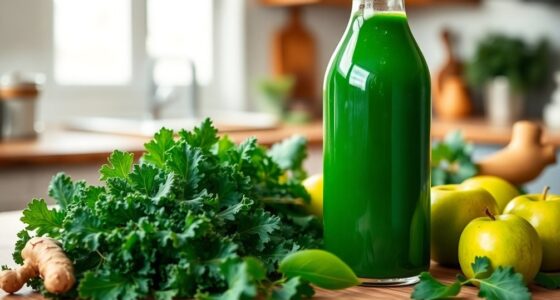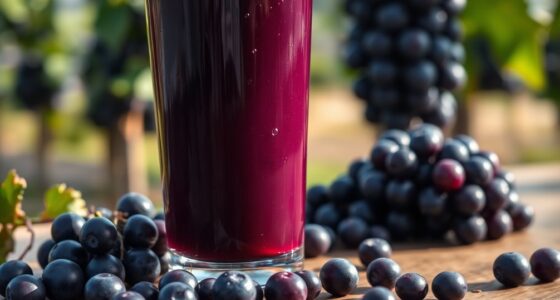Pineapple juice is quite acidic, with a pH level ranging from 3.5 to 3.7. This acidity is mainly due to citric acid, which makes up 87% of its acid content, while malic acid contributes the remaining 13%. This level of acidity is similar to that of orange juice. If you're sensitive to acidic foods, it's important to monitor how pineapple juice affects you and explore effective ways to enjoy its benefits safely.
Key Takeaways
- Pineapple juice has a pH level ranging from 3.5 to 3.7, indicating high acidity.
- The acidity is primarily due to citric acid, which makes up 87% of its content.
- Malic acid contributes an additional 13% to the overall acidity of pineapple juice.
- A one-unit change in pH represents a tenfold difference in acidity levels.
- Regular consumption can lead to digestive discomfort and dental erosion due to its strong acidity.
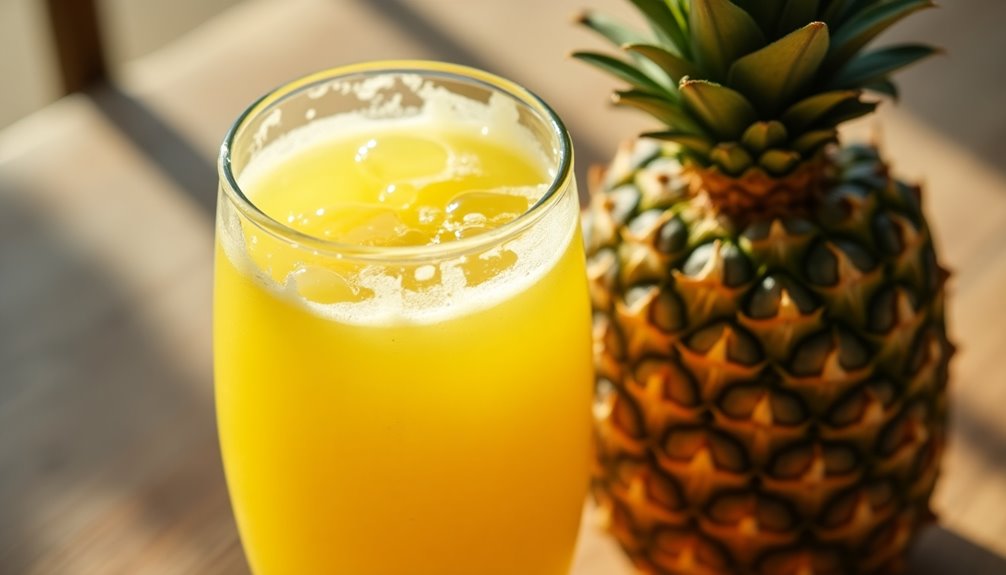
Have you ever wondered just how acidic pineapple juice really is? If you're a fan of this tropical delight, you'll be surprised to learn that its pH level ranges from 3.5 to 3.7, making it quite acidic. This acidity is comparable to that of orange juice, which also hovers around the same pH. Given this information, it's essential to understand what this means for your health and how it can affect you.
The acidity in pineapple juice primarily comes from citric acid, which makes up about 87% of the total acids found in the juice. Malic acid accounts for the remaining 13%, contributing to the overall tart flavor you might associate with pineapple juice. It's fascinating to note that each unit change in pH represents a tenfold difference in acidity. This means even a small shift in pH can significantly impact how acidic the juice is.
So, when you sip on that refreshing glass of pineapple juice, you're consuming a beverage that's significantly acidic.
This high acidity can have some implications for your health. If you're someone who struggles with acid reflux or other digestive issues, you might want to be cautious. Regular consumption of pineapple juice can exacerbate these conditions for sensitive individuals. The acidity may irritate your stomach lining or esophagus, leading to discomfort. It's crucial to listen to your body and be mindful of how it reacts to foods and beverages with high acid content.
Moreover, pineapple juice's acidity doesn't just stop at digestive concerns; it can also impact your dental health. The strong acidity can erode tooth enamel over time, making your teeth more susceptible to decay. If you enjoy pineapple juice regularly, consider rinsing your mouth with water afterward to help neutralize the acids and protect your teeth. You could also try using a straw to minimize contact with your teeth, reducing the risk of enamel erosion.
While pineapple juice does offer some health benefits, like vitamin C and antioxidants, moderation is key. Enjoying it as part of a balanced diet can keep you from experiencing the negative effects of its acidity. If you're prone to digestive issues or concerned about your dental health, it might be wise to limit your intake or opt for diluted versions of the juice.
Frequently Asked Questions
Is Pineapple Juice Really Acidic?
Yes, pineapple juice is really acidic. Its pH level falls between 3.5 and 3.7, making it more acidic than many other beverages.
When you drink it, you might notice a tangy taste that comes from its high citric and malic acid content.
If you're sensitive to acidity, be cautious, as it can lead to dental erosion and digestive issues.
Moderation is key to enjoying its flavor without the negative effects.
What Is the Most Acidic Fruit Juice?
Imagine biting into a fresh lemon, the tangy juice instantly zinging your taste buds.
When you're looking for the most acidic fruit juice, lemon juice takes the crown with a pH level between 1.8 and 2.4. This sharp acidity makes it a favorite in cooking and drinks.
While orange and pineapple juices are tasty, they can't match the tart punch of lemon juice, which brings a vibrant flavor to any dish or beverage.
Is Pineapple More Acidic Than Oranges?
You might wonder whether pineapple is more acidic than oranges.
Both juices have similar acidity levels, with pineapple juice ranging between 3. 5 and 3. 7 pH, just like orange juice, which sits around 3. 7. This similarity in acidity not only influences their flavor profiles but also impacts their potential uses in culinary applications. Consumers often seek ways to enjoy these juices without excessive acidity, leading to interest in methods like how Tropicana reduces orange juice acidity to create a smoother and more palatable product. By utilizing various processing techniques, they ensure that even those sensitive to acidity can enjoy orange juice without discomfort.
While they share comparable acidity, your experience may vary. Some people find pineapple juice causes more digestive discomfort compared to orange juice, so how acidic it feels can depend on your individual tolerance and taste preferences.
Is Pineapple Juice Ok for Acid Reflux?
Think of your stomach as a delicate garden; some plants thrive while others wilt under certain conditions.
If you're considering pineapple juice, be cautious. Its acidity can act like a stubborn weed, triggering acid reflux for some folks.
While you might enjoy its tropical sweetness, it's wise to monitor how your body reacts. Keeping a food diary can help you pinpoint if pineapple juice is a troublesome guest in your garden of foods.
Conclusion
In conclusion, while you might worry about pineapple juice being too acidic for your stomach, it’s important to remember that its natural enzymes can actually aid digestion. So, instead of shying away from that delicious tropical flavor, embrace it! Enjoying pineapple juice in moderation can provide plenty of health benefits without overwhelming your system. So go ahead, sip that refreshing juice and relish in its zesty goodness—your taste buds will thank you! Additionally, if you’re curious about how long fresh pineapple juice lasts, it’s best to store it in the refrigerator in an airtight container for about 3 to 5 days. Enjoy it within this timeframe to maximize its flavor and nutritional benefits. So go ahead and experiment with various recipes, from smoothies to cocktails, ensuring you savor that vibrant taste while it’s at its freshest!
Cindy thoroughly researches juicing trends, techniques, and recipes to provide readers with practical advice and inspiration. Her writing style is accessible, engaging, and designed to make complex concepts easy to understand. Cindy’s dedication to promoting the advantages of juicing shines through her work, empowering readers to make positive changes in their lives through the simple act of juicing.

